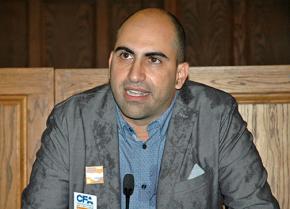Salaita is still seeking justice
reports on Steven Salaita's decision to sue the University of Illinois.
STEVEN SALAITA has filed a federal lawsuit against the University of Illinois at Urbana-Champaign (UIUC) for illegal terminating him last year just weeks before he was set to begin teaching. Salaita's suit charges that the university violated Salaita's right to free speech when it fired him for his pro-Palestine tweets condemning Israel's 50-day assault on Gaza during the summer of 2014.
"In the United States, Professor Salaita's criticisms of Israeli state policy are infrequently heard from American politicians or presented in the mainstream or national media," reads the lawsuit. "The university administration, facing pressure from wealthy university donors, fired Professor Salaita for his political speech challenging prevailing norms."
Salaita's dismissal prompted a global outcry via social media, a boycott of UIUC by many academics until it reinstates Salaita, and a movement of students and faculty at the university itself.
For supporters of Palestinian rights, free speech and academic freedom are under assault, especially on college campuses, where pro-Israel networks have sought to censor viewpoints they oppose. "No one--not even the university administration--disputes the fact that it acted based on Professor Salaita's speech," according to the lawsuit.

In the last two years, there have been more than 200 documented cases of students, faculty and activists being intimidated, smeared and even prosecuted for speaking out in support of Palestinian human rights. "The most common tactic...is to falsely equate legitimate challenges to Israeli government action with anti-Semitism or to label passionate rhetoric 'uncivil'," according to Maria LaHood of the Center for Constitutional Rights.
This is precisely how the University of Illinois attacked Salaita.
"My primary motivation in bringing this suit is to join my colleagues in the American Indian Studies program and begin teaching," Salaita told reporters during a media conference call coordinated by his lawyers after the suit was filed on January 29.
The lawsuit also focuses on an unnamed donor or donors for their role in demanding that the university fire Salaita. The university still has not complied with a Freedom of Information Act request for documents pertaining to those communications, and it is fighting a suit filed by Salaita last November to compel it to produce those documents.
In response to Salaita's legal complaint, UIUC issued a statement. "Many claims in the U of I statement are incorrect, and others seem to confess to precisely the punishment of political speech that Salaita's lawsuit is based upon," according to The Academe Blog.
To cite only the most worst example, the UIUC statement asserts that Salaita's tweets "demonstrate that Dr. Salaita lacks the judgment, temperament and thoughtfulness to serve as a member of our faculty in any capacity, but particularly to teach courses related to the Middle East." According to The Academe:
This is a highly unusual claim: that scholars who teach courses related to the Middle East must meet higher standards of "temperament" than other scholars. Why is this? Obviously, it's because the Middle East is a politically controversial topic. So the University of Illinois is essentially admitting that it refused to hire Salaita due to worries about his viewpoint on a politically controversial issue, and that it subjected his appointment to greater scrutiny due to his politics. This kind of admission in a carefully prepared statement is a serious blow to their legal case, since it undermines any assertion that Salaita was treated fairly like any other hire.


